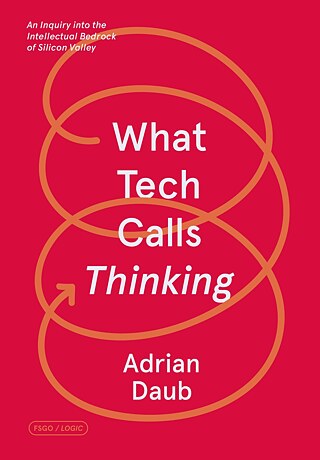Discussion
What Tech Calls Thinking

Adrian Daub in Conversation with Bianca Wylie
On Thursday, May 27th at 6PM EST, join author and academic Adrian Daub and open Government advocate Bianca Wylie as they discuss the current language, ideology and accessibility of Big Tech.
Register!

Adrian Daub
Adrian is the author of six academic books: Four-Handed Monsters: Four-Hand Piano Playing and Nineteenth Century Culture was published by Oxford University Press in 2014 (the substantially different German version: “Zwillingshafte Gebärden”: Zur kulturellen Wahrnehmung des vierhändigen Klavierspiels im neunzehnten Jahrhundert appeared in 2009). Uncivil Unions: The Metaphysics of Marriage in German Romanticism and Idealism and Tristan’s Shadow: Sex and the Total Work of Art after Wagner appeared with University of Chicago Press in 2012 and 2013 respectively. His book The Dynastic Imagination: Family and Modernity in 19th Century Germany was published by Chicago in late 2020 and What The Ballad Knows will appear with Oxford University Press in 2021.
Adrian's academic articles have dealt with topics as diverse as Richard Wagner, early feminism, Charlie Chaplin, and literary scandals. He has written about writers like W.G. Sebald, Heinrich Heine, Dorothea Schlegel, Frank Wedekind, Stefan George, and Alexander Kluge; about composers like Franz Schreker, Richard Strauss and Olivier Messiaen; artists and directors like Hans-Jürgen Syberberg, Stanley Kubrick, Hermann Nitsch, Günther Brus, Terrence Malick and even Quentin Tarantino. He previously served as the co-editor of the Goethe Yearbook and has guest-edited issues of Opera Quarterly and Republics of Letters.
He is also an active cultural critic and political commentator. With Charles Kronengold he published, The James Bond Songs: Pop Anthems of Late Capitalism (Oxford University Press, 2015), and a book of his German-language essays appeared with Hanser Verlag as Pop-Up Nation in 2016. What Tech Calls Thinking appeared with Farrar Straus & Giroux in 2020, a German translation (Was das Valley Denken Nennt) was published by Suhrkamp Verlag in November 2020.
Adrian write about politics, literature, culture and universities for German newspapers (Frankfurter Allgemeine Zeitung, Süddeutsche Zeitung, DIE ZEIT, Neue Zürcher Zeitung and others) and for Anglo-American outlets (n+1, The Guardian, Longreads, OneZero, The New Republic, Public Books, Los Angeles Review of Books, Huffington Post and Paste Magazine), and have appeared on the radio in both Germany, the UK and the US. Together with Laura Goode he hosts the podcast The Feminist Present, which features weekly interviews with important feminist voices from across the world.
Bianca Wylie
Bianca is an open government advocate with a dual background in technology and public engagement. She is the co-founder of Digital Public, a co-founder of Tech Reset Canada and is also a Senior Fellow at the Centre for International Governance Innovation. She holds a Bachelor of Arts in Political Science from York University. She worked for several years in the tech sector in operations, infrastructure, corporate training, and product management, most recently at Thomson Reuters. In her tech career she had the opportunity to help create a global support escalation system, to integrate legacy software products into a new platform, and to manage sprints (release cycles) of software.
As a facilitator at Swerhun Inc., she designed, delivered and supported public consultation processes for various governments and government agencies, with a focus on cities. She worked on topics such as transportation, urban planning, parks and public realm, real estate development, and libraries.
In 2014, Bianca founded the Open Data Institute Toronto, a volunteer-run node of the Open Data Institute in the UK. In this capacity, she’s organized civic hackathons with BikeShare Toronto, the Toronto Public Library, and others. She’s given talks and run workshops on open data and civic engagement for a range of partners in Toronto, including the Ontario Non-Profit Network and the Institute of Public Administration of Canada. In 2016 she co-founded Civic Tech Toronto.
In 2017, Bianca took part in a City Hall Task Force organized by the University of Toronto School of Public Policy and Governance. She sat on the Ontario International Open Data Charter Advisory Committee, as well as the selection committee for Canada’s first Open Government Civil Society Network, a group tasked with providing oversight to the federal open government program. Since the beginning of her work as an open government advocate, Bianca has helped organize annual community events such as Toronto’s open data day, Go Open Data, and the Canadian Open Data Summit.
Bianca is a tech policy writer, with recent pieces published in VICE , The Globe and Mail and Huffington Post Canada. She is also a speaker on open government and public sector technology policy.
Bianca currently sits on the the Toronto Public Library’s Innovation Council.